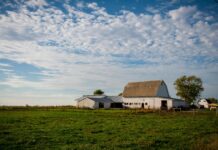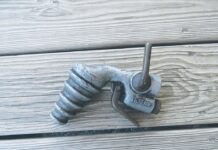Wilbur George, a friend from near Carrollton, told me he had an old, wooden grain drill that he had bought some years ago at the Rogers sale and used every year to plant a couple of acres of oats for his horses.
Local dealer?
The stenciling on the hoe-type drill reads, “Missouri Force Feed Grain & Fertilizer Drill,” and other stenciling indicates it was made by the Genesee Valley Manufacturing Co. of Mount Morris, N.Y.
The thing Wilbur was really curious about was a brass tag affixed to the drill that reads, “Dickey & Wonstetler, Signal, Ohio.” He wondered if there was ever a dealer by that name located in Signal which, for those of you who don’t know, is a tiny crossroads community of just a few houses a mile west of the Rogers Community Sale on state Route 154.
Research
That’s the kind of question I enjoy, it brings out the Sherlock Holmes in me. I checked some old phone directories in the Lisbon library and found Dickey & Wonstetler General Store listed as being in Signal from the earliest directory, 1922, up until 1939, but not in the 1940 edition. Next, I found that the F. Hal Higgins collection at the University of California, Davis, contained a circa 1899 Genesee Valley Mfg. Co. catalog and ordered a photocopy.
Remembering past. I knew from my days as a telephone repairman back in the late 1950s, of the general store and post office in Signal that sat right along the old Pittsburgh, Lisbon & Western rail line that used to run through Signal, Elkton and on to Lisbon. I also was pretty sure there was a Dickey family who had lived for years in Signal and that was possibly related to the Dickey in Dickey & Wonstetler.
Family ties
Upon contacting Charles Dickey who, along with his lovely wife, Lois, still lives in the house in Signal that his father built about 1900, I found that his great-uncle, Jefferson John Dickey, ran the store and was Signal’s seventh postmaster from 1906 until he retired in 1940.
Jefferson Dickey’s daughter Erma, was married to Alvin Wonstetler and was Dickey’s partner in the store and Assistant Postmaster the entire time. When Jefferson retired in 1940, Erma was appointed in his place and served as Postmaster until she, too, retired in 1946.
Documenting the past
In her later years, Erma Dickey Wonstetler wrote a number of wonderful papers setting out the history of the Dickey family, the Signal Post Office, and Signal itself. Mr. and Mrs. Dickey generously permitted me to take these precious hand-written records home with me to use in writing this story.
There is no evidence that Dickey & Wonstetler were farm machinery dealers — Aunt Erma makes no mention of selling farm implements, nor does Charles Dickey remember hearing of such activity. However a lot of rural general stores did back in those days and I believe that, although not dealers in the modern sense, that if a customer came to them and placed an order, that Dickey & Wonstetler had the contacts to get the desired machine.
Ideal location
The store was in an ideal spot to handle larger implements like grain drills. It was right on the Pittsburgh, Lisbon & Western Railroad and machinery could be shipped from the factory via the Pennsylvania R.R. to New Galilee, Pennsylvania, where it was transferred to the P., L. & W., which interchanged with the PRR there, for the trip through Darlington, Negley and Rogers to Signal.
In those long ago days, the seller didn’t deliver the machine, but notified the buyer that it had arrived and was sitting on a railroad car at the siding or team track. The buyer then harnessed his team, drove it to the store or station, and helped to unload his machine, as well as any others that were on the same car.
He then assembled his implement, hitched his team to it, and hauled it home. In the case of a smaller implement, such as a plow or harrow, the buyer might pull his wagon to the store and haul the tool home on that, but larger, wheeled machines, such as mowers, grain drills, or grain binders, traveled on their own wheels.
Drill order
Mr. Dickey would have ordered the Missouri grain drill from the Genesee Valley Manufacturing Company in Mt. Morris, in western New York. I haven’t uncovered any history on the Genesee Valley firm, but it advertised its Missouri grain drill in the 1888 Farm Implement News Buyer’s Guide, bragging on the fact that the drill was “The lightest and best in America,” with “Broadfaced high wrought iron wheels. No wood spokes or felloes. No tires coming loose.”
Genesee Valley Manufacturing was still listed in the 1930 Buyer’s Guide as making drills, but had disappeared by the time the 1939 edition came out; probably just one more victim of the Great Depression.
In a circa-1900 Genesee Valley catalog, Albert Reed from Burghill in Trumbull County, Ohio, wrote: “For the past sixteen years I have been engaged in farming, and during that time have worked four or five different kinds of grain drills. (A year ago) I chanced to hire a Missouri drill, and was so well pleased (that I purchased one). It works to my entire satisfaction, does not bunch, and distributes most evenly; does not clog; is easily handled, and in my humble opinion is the nearest to perfection of any drill I have ever seen.”
Other implements
Besides the Missouri grain drill, Genesee V alley made three different land rollers, corn shellers, wooden frame spike-tooth harrows, turbine water wheels, and broom making machinery. In addition, the firm manufactured several different sizes and styles of tailor’s irons, as well as sad irons from five to nine pounds each. Feel sorry for the poor housewife who had to wield an eight or nine pound iron all day.
Generosity
Many thanks to Charles and Lois Dickey, as well as to Aunt Erma Wonstetler, for this glimpse at what life was like during the early part of the 20th century. You’ll hear more of Wonstetler’s Post Office adventures in my next column.













Hi Mr. Moore!
My name is Heidi Reid (maiden name Zimmerman)
My Dad is Paul Zimmerman
My Grandmother Beulah Zimmerman (maiden name Green)
My Great Grandparents are Chaunce Green & Gladys Green (maiden name Dickey) Gladys’s sister is Erma Wonsetler, so Erma is my Great, Great Aunt.
I enjoyed your article above and will keep it as an invaluable reference for my Dickey Ancestry project I’m starting to do. Do you have any other info on anyone in the Wonsetler or Dickey or Green family? Any pics of any related to the Dickey family? Keep me posted if you have any info on my family – look forward to more articles! I grew up in Niles/Vienna Ohio and moved with my family to California when I was 12. My roots will always be in Ohio.
Thanks!!
Heidi